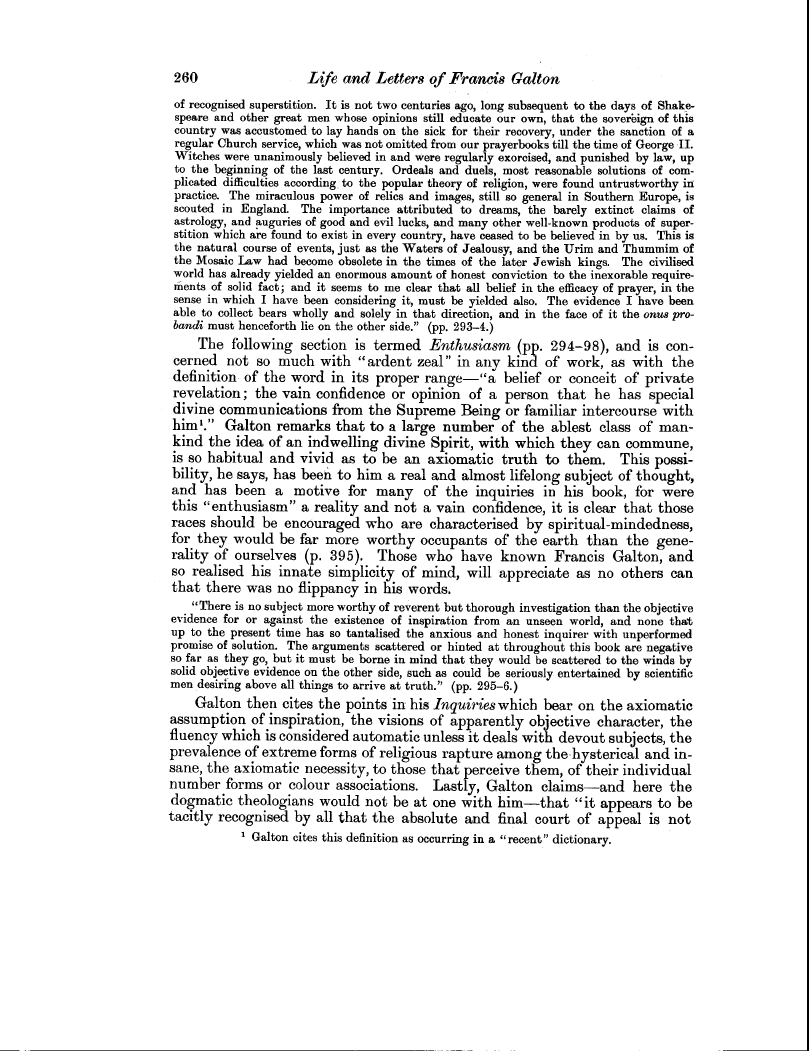260 Life and Letters of Francis Galton
of recognised superstition. It is not two centuries ago, long subsequent to the days of Shakespeare and other great men whose opinions still educate our own, that the soverbign of this country was accustomed to lay hands on the sick for their recovery, under the sanction of a regular Church service, which was not omitted from our prayerbooks till the time of George II. Witches were unanimously believed in and were regularly exorcised, and punished by law, up to the beginning of the last century. Ordeals and duels, most reasonable solutions of complicated difficulties according. to the popular theory of religion, were found untrustworthy in practice. The miraculous power of relics and images, still so general in Southern Europe, is scouted in England. The importance attributed to dreams, the barely extinct claims of astrology, and auguries of good and evil lucks, and many other well-known products of superstition which are found to exist in every country, have ceased to be believed in by us. This is the natural course of events, just as the Waters of Jealousy, and the Urim and Thummim of the Mosaic Law had become obsolete in the times of the later Jewish kings. The civilised world has already yielded an enormous amount of honest conviction to the inexorable requirements of solid fact; and it seems to me clear that all belief in the efficacy of prayer, in the sense in which I have been considering it, must be yielded also. The evidence I have been able to collect bears wholly and solely in that direction, and in the face of it the onus probandi must henceforth lie on the other side." (pp. 293-4.)
The following section is termed Enthusiasm (pp. 294-98), and is concerned not so much with "ardent zeal" in any kind of work, as with the definition of the word in its proper range-"a belief or conceit of private revelation; the vain confidence or opinion of a person that he has special divine communications from the Supreme Being or familiar intercourse with him'." Galton remarks that to a large number of the ablest class of mankind the idea of an indwelling divine Spirit, with which they can commune, is so habitual and vivid as to be an axiomatic truth to them. This possibility, he says, has been to him a real and almost lifelong subject of thought, and has been a motive for many of the inquiries in his book, for were this "enthusiasm" a reality and not a vain confidence, it is clear that those races should be encouraged who are characterised by spiritual-mindedness, for they would be far more worthy occupants of the earth than the generality of ourselves (p. 395). Those who have known Francis Galton, and so realised his innate simplicity of mind, will appreciate as no others can that there was no flippancy in his words.
"There is no subject more worthy of reverent but thorough investigation than the objective evidence for or against the existence of inspiration from an unseen world, and none that up to the present time has so tantalised the anxious and honest inquirer with unperformed promise of solution. The arguments scattered or hinted at throughout this book are negative so far as they go, but it must be borne in mind that they would be scattered to the winds by solid objective evidence on the other side, such as could be seriously entertained by scientific men desiring above all things to arrive at truth." (pp. 295-6.)
Galton then cites the points in his Inquiries which bear on the axiomatic assumption of inspiration, the visions of apparently objective character, the fluency which is considered automatic unless it deals with devout subjects, the prevalence of extreme forms of religious rapture among the-hysterical and insane, the axiomatic necessity, to those that perceive them, of their individual number forms or colour associations. Lastly, Galton claims-and here the dogmatic theologians would not be at one with him-that "it appears to be tacitly recognised by all that the absolute and final court of appeal is not
1 Galton cites this definition as occurring in a "recent" dictionary.

